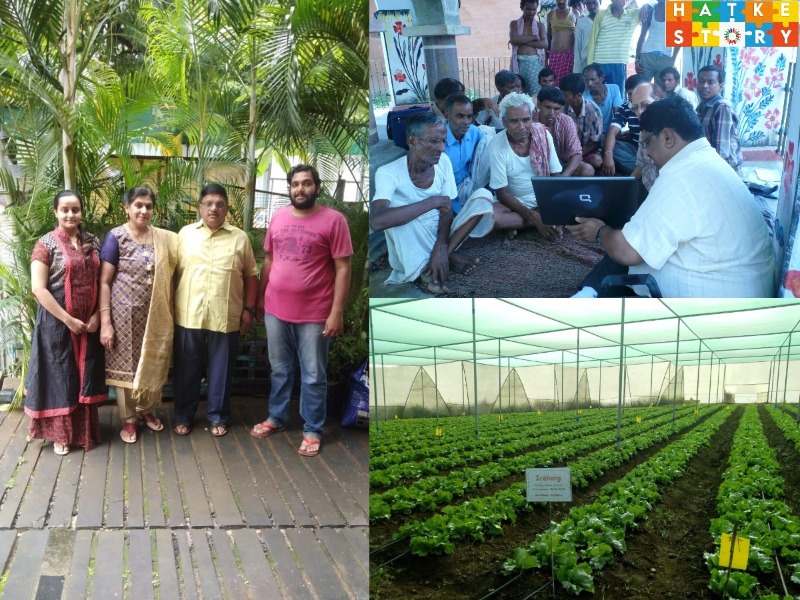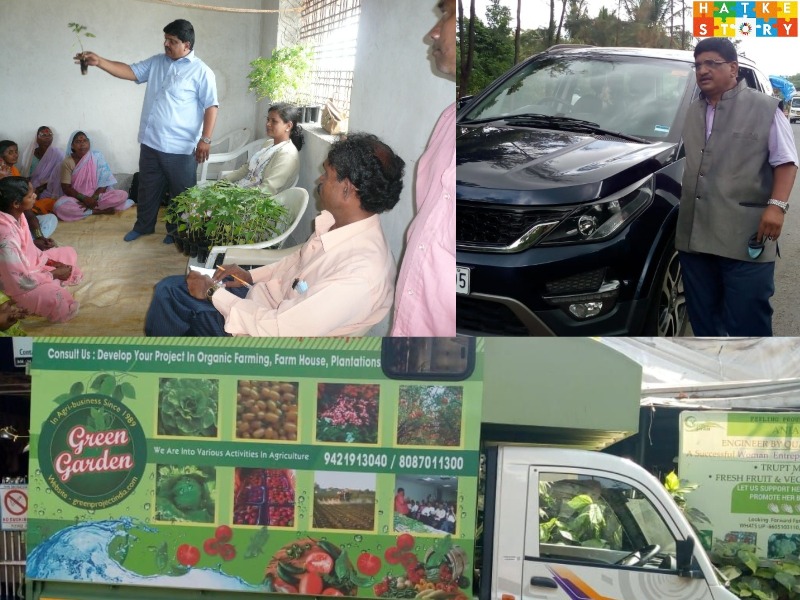Agriculture in India is often associated with incongruities of weather, farmer suicides, the politicization of farmer benefits, and agendas beyond a simple Kisan’s understanding. Do farmers need freebies and subsidies? Why aren’t agriculture graduates going back to their lands to pursue farming? What are the goals of the Indian farmer, and are they being met?
Gomathi Reddy, in a freewheeling chat with Dr. Nitin Bhore – a Ph.D. scholar in Agriculture – gets to the root of the problem for farmers in India.
Dr.Bhore is a much sought Agripreneur for his deep knowledge about commercial crop cultivation. He has executed several projects for progressive farmers and corporate houses, MNCs, NGOs, and research institutes, across India. He is a top consultant with leading Universities, Colleges, State, and Central government bodies, to train farmers and Agri professionals on innovative Agri practices relevant to India.
Gomathi: Dr. Nitin Bhore, thank you for consenting to share your experiences with HatkeStory. Give us an idea about your childhood and why you chose agriculture as your career?
Dr. Nitin Bhore – I am from Pune, Maharashtra. My father, Late Dr. Bhore, was the Head of the department (HOD) of Horticulture at the Agriculture College of Pune. We used to live in the staff quarters on the campus. I spent all my growing years watching greenery on the campus. I was hands-on with the entire growing cycle of vegetables, fruits, pulses, cereals – I just loved the experience of being one with nature.
I did my UG in horticulture on the same campus, and I chose Botany as my specialization for my M.Sc. My dissertation focused on Chrysanthemum, a very high commercial value flower, both as a loose or cut flower. India has a high demand for Chrysanthemum.
I was also equally passionate about sports. At school, I was a National level football player. It honed my innate skills to focus, strategize, and I understood that one must play to win.
In my mind, Agriculture was the only career option. My education, temperament, entrepreneurial nature, and passion for making a difference in agricultural practices in India were shaped by this fixation. Nothing else was interesting to me.
Gomathi: Were you an Agripreneur from day one?
Dr. Nitin Bhore – Oh, no! Hands-on experience in commercial crops, valuation, sourcing, and overcoming the day-to-day challenges of the food value chain comes out of some heartburn and a lot of hard work. I learned it with consistent zeal and determination to be the best on the field.
I started as a procurement officer at SIL – a big food processing brand with a national presence in the jams, sauces, and organic products segment. I learned a lot about sourcing produce, methods of contract farming, farmer’s challenges, and how badly our farmers need to be educated. Theoretically, a farmer can raise 30,000 kg tomatoes per acre of land with the proper farming methods. But our Indian farmers were raising 8000 to 10,000 kg per acre.
When I told them this fact, they laughed at me. I decided that I needed to educate the farmers by proof and not by sharing theory. I collected information about high-yielding crop varieties and best practices. I adapted them to suit Indian conditions on our small patch of land and was happy with the results. I felt working for someone can never give you scope to implement your learnings, so I quit my job at SIL.
As a self-employed person, I started working on 50 different types of Indian and exotic vegetables and fruits and recorded their crop cycle, yield, and market reach. I was getting thorough with the entire food-to-fork cycle. During this period, Trikaya Agriculture hired me as a consultant for their greenhouse farming venture. They focused on 25 different exotic vegetables, 15 different exotic herbs, and 20 different flowers as commercial crops.
They worked with hi-end hotels, restaurants, and gourmet outlets across India’s western and northern belt. Here I learned that the slightest variation in the amount of Plant Growth Regulators (PGRs) or organic supplements or higher transpiration rates during summer and monsoons could alter the color and taste of vegetables. The slightest variations can lead to star hotels rejecting your product. One must have complete knowledge of the finer aspects of raising commercial crops – I learned this here.
And my passion for becoming a farmer and Agripreneur was on fire.
Gomathi: As an Agripreneur, how were your early days of commercial cultivation? What were your profit margins?
Dr. Nitin Bhore – I placed an advertisement asking for 7 acres of land with electricity, close to proper roads, and a running river. My resources as the son of a government employee were limited. So, I leased the land for Rs.12,000 per acre per year. I purchased a second-hand van, converted that to a delivery van to lug my vegetables to the nearby market. I was making profits, but not on the scale I wanted. But, I was not disappointed.
I wrote to all the high-end housing societies in Pune. I requested permission to sell organic vegetables to their society on specific days of the week. Almost everyone agreed, and I could now park my vehicle in their shopping area and sell my produce. It was the turning point in my career. In 1991, I was making 20,000 per day, thrice a week, on organic fresh vegetables. I always used to ensure that my prices were Rs. 2-3 less than the market prices per kg.
But since my yield per acre was good, I used to make an excellent profit. Soon, the societies wanted me to sell onions, ginger, and fruits. I could see that this was a huge opportunity, but I did not have the requisite land to cultivate all they needed. In these societies, I met some of the most respectable, benevolent folks and corporate leaders viz., Prakash Chhabria of Finolex Industries, Mukesh Malhotra of Weikfield Food Products India Ltd., and Balaji Rao of Venkateshwara Hatcheries. They all asked me to use their vacant lands to raise a crop. I was willing to buy back their produce at a mutually agreed-upon price.
It was a win-win situation for all of us. Soon, I had a couple of hundred acres of fertile land that I could use for commercial cultivation. And then there was no looking back.
Gomathi: Wow! That’s quite some success. But, how many hours should one work to meet success in agriculture?
Dr. Nitin Bhore – Initially, you must be willing to work 24 x 7. If you are a farmer, forget Sunday outings to the mall. You must have a voracious appetite for learning. I was like that. I was shrewd, open-minded to learn from everyone, and agile in my implementation.
You don’t have to be a farmer to be part of this domain. The food value chain has different nodes, and each one requires a different level of expertise and skill. Depending on your skills, you can become part of an existing team or take ownership of a specific node to provide niche services to multiple farmers or Agripreneurs.
There is a lot to be done in this segment, and with imagination, you can meet material success quickly.
Gomathi: If there is so much scope, why are our farmers committing suicides?
Dr. Nitin Bhore – Agriculture per se can be a challenging domain. Years of chemical fertilizers and pesticide use and ignorance of our illiterate farming communities make it harder to correct the system. That is why Agriculture in India needs professionals from other domains to step in.
Only 5% of the agri-community in India knows how to make good use of their land. The other 95% is lost in the gale winds of policy changes, subsidies, and farming lobbies. The lack of scale of small landholdings, knowledge about seeds and organic methods, ignorance about Agritech and the advances in the rest of the world, not knowing what the market needs or which will get you optimum returns compound the problem.
For example, Orchids, Anthurium, Bromeliads are high-paying crops with a good shelf life. Why should a farmer spend his sweat and toil on Roses that sell at Rs 10 – 15 per kilo when the same energy can yield Orchids at Rs.80. Likewise, Mangosteen, a high-paying crop, can be raised instead of mangoes; edible bamboo shoots are a great buy with hi-end hotels and restaurants, so is asparagus; Micro-greens are quick to grow and are very profitable.
Once farmers are guided and trained to connect with the correct nodes in the food value chain, implement sustainable methods of irrigation, suicides will be a thing of the past. Indian farmers don’t need subsidies. They need the training to adopt innovative farming techniques.
Gomathi: How did your family support your journey?
Dr. Nitin Bhore – My wife has been massive support from day one, and she continues to play a pivotal role in my work. She comes from an agricultural background. She takes care of the farm side on days that I spend time consulting and lectures.
Our son, a logistics and supply chain professional with an MBA in International Business and rich experience working for the South Korean export steel enterprise POSCO, has also stepped into our commercial cultivation business. He focuses on forging relationships with international partners. My daughter-in-law is an engineer who comes from a grape vineyard owner’s family. She is a hands-on contributor to scaling our Agribusiness to a much larger scale.

Gomathi: Give us your last word for our readers to take a plunge into agriculture?
Dr. Nitin Bhore – Agriculture, like any other domain, requires continuous learning. I did my Ph.D. not to get into a job but to apply my doctoral study’s learnings to address the quality concerns of our produce. One must take measures to maintain standards and work with professionals to improve yields.
As a final word, I invite young and old alike to step into agriculture and experience its goodness to one’s soul and their pocket. Be willing to put your best foot forward, and the positive results can surprise you!
On that note, we sign off with Dr. Nitin Bhore, thanking him for sharing his knowledge with our readers.
Connect with him: bhorenitin@rediffmail.com | www.greenprojectsindia.com
Like us on FB, if you find our content interesting: https://www.facebook.com/hatkestoryofficial/
Do you have an interesting incident or experience to share with the world? Write to us, and together we can discuss how to weave your story and present it to the world. Would you mind sending us your story?







Comments are closed.